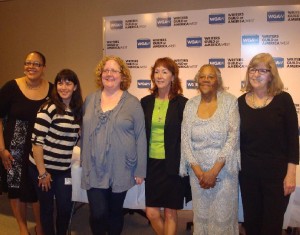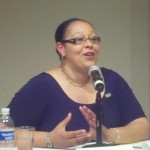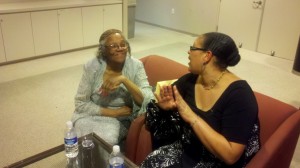Social Work Team Pitches Women’s Health Stories in Hollywood

Panel participants from left: Tricia Bent-Goodley, Stacy Owens, moderator Elizabeth Laviter, Kathy Gurland, Jacki McKinney and Colleen Keenan.
Social worker Jacki McKinney, with her sweet smile and silver hair, could be your grandmother.
But the stories she told a group of screenwriters at Writers Guild of America, west in Los Angeles on March 31 were not sweet fairytales you would expect to hear from a grandparent.
McKinney, 76, MSW, was sexually abused as an infant and was later ostracized by her community because of it. She later developed depression and mental illness, which is common among people who experience severe trauma in their youth.
“There were people who wouldn’t let their children play with me and I was cute and bright,” said McKinney, who now works with the Substance Abuse and Mental Health Services Administration (SAMHSA) as a consumer advocate for other people with mental illness.
McKinney was part of a panel to educate Hollywood writers about women’s health issues. Other social workers on the five-member panel were Kathy Gurland, MSW, LCSW, who founded the Peg’s Group cancer care navigation consulting service in New York City after she lost two sisters to cancer, and Tricia Bent-Goodley, Phd, LCSW-C, a Howard University social work professor who is a nationally recognized expert on domestic violence.
The other members of the panel were Dr. Colleen Keenan, a nurse and interim director of the University of California, Los Angeles Nurse Practioner Program who is an expert on women’s reproduction issues; and Stacey Owens, who was diagnosed with cancer in 2005 at age 20 and is now in remission and works with I’m Too Young for This! Cancer Foundation, a support group for young people adults with cancer.
The event was produced by the Entertainment Industries Council in partnership with the National Association of Social Workers, NASW Foundation and SAMHSA. Also in attendance was past NASW President Suzanne Dworak-Peck, who managed a Hollywood-based entertainment consulting organization for 20 years, and NASW Communications Director Gail Woods Waller.
McKinney, Gurland and Bent-Goodley answered questions from the writers about their work, weaving in stories that could be turned into plotlines or developed into social work characters.
For instance, writers asked Gurland what it is like working with doctors.
There is a slew of medicals shows on television, including “Grey’s Anatomy” and ABC and “Nurse Jackie” on Showtime. However, writers rarely depict the fact that social workers are in hospitals advocating for treatment and services for patients and their families, Gurland said. Often, this advocate role is given to doctors and nurses, which rarely happens in real life.
Bent-Goodley said the treatment of domestic abuse in Hollywood is too narrow and does not show the complexity of the problem.
The stories that do not get told are that girls as young as 11 to 13 can be the victims of abuse at the hands of boyfriends, and since Americans are living longer women over the age of 55 can also be victims of abuse as they form new relationships.
Domestic abuse also affects women of all socio-economic levels, the effects of the violence can haunt victims long after they escape the abuse, and Hollywood writers fail to capture how resilient and resourceful domestic violence survivors can be, Bent-Goodley said.
Bent-Goodley’s other pet peeve is that Hollywood shies away from how spirituality and religion can sometimes harm victims.
She told the story of a minister’s wife whose husband went online to get sex. When she confronted him alone at church he banged her head against the pulpit.
The woman is trapped because her husband is a respected member of the community and no one suspects he is an abuser, Bent-Goodley said. He also plays the role of a faithful husband, driving her to doctor appointments.
“She now has epileptic seizures — she blacks out,” Bent-Goodley said.
Gurland urged writers to go “straight to the source” and seek out social worker experts when writing about medical care and other social issues.
McKinney said television shows and movies never show people who suffer from mental illnesses getting well — instead they are made fun of or portrayed as psychopathic murders.
Bent-Goodley challenged writers to better educate the public about violence and other issues social workers help people overcome.
“You have the power to break the stigma, to show women are resilient and not just sitting around as victims,” she said. “They are trying to come up with solutions.”
Maria Elena Rodriguez, a writer who has worked on the 2003 miniseries “Kingpin” and the television series “Resurrection Blvd,” said social workers must work hard to gain influence.
Rodriguez has written a pilot television program about a social worker in a teen group home but has not sold the project.
She thinks this is because Hollywood is now obsessed with police shows. Crime programs continue to be popular so studios have little motivation to try other formulas, including plotlines that include social workers or issues important to that profession, Rodriguez said.
“There is no shortage of cop shows, no shortage of crime,” she said. The studios “feel it is a place where the well will never run dry.”
Tom Bourgeois, who works in the standards and practices department of CBS, said there is hope Hollywood will turn more to social workers for expert advice and story ideas. Bourgeois said social workers can do this by appealing directly to executives who run television shows, who in turn will direct writers to include more social workers and their issues in storylines.
Bourgeois also said he and other entertainment industry officials came away from the meeting with an interesting new angle for possible future storylines — that social workers in the healthcare field are part of an interdisciplinary team that works with doctors, nurses and others to help the sick and mentally ill.
“That is fresh and new,” he said.
The Entertainment Industries Council, in collaboration with NASW, the National Association of Chain Drug Stores Foundation, and the National Association of Broadcasters, previously hosted “Picture This: Women’s Health.” The event was a forum for health experts and advocates to recommend priorities for writers, directors, producers and other creative talent. To read the report on “Picture This: Women’s Health” click here.
| Leave A CommentAdvertisement
2 Comments
Leave a Comment
You must be logged in to post a comment.






A big thank you to all of you who attended this meeting. You brought up so many good points, hopefully Hollywood will take some of your comments seriously. It seems that there is much ignorance around what social workers actually do and the impact that they have.
There are many stories yet to tell…they just have to appeal to the viewers so that Hollywood makes money. I am sure there is a way to make that happen for example, cast actors that are appealing in the roles. “If you make it with actors that draw …the viewers will come”. Thanks again everyone.
As a former journalist and currently a writer I think this is awesome! I want to point out that Hollywood is a great end goal, but that contacting your local newspaper is an even better way to begin to generate awareness. Reach out to your local health, features or news editors and suggest they have a series of articles on social workers, the role they play in the community and what they do. Most newspapers want the same thing Hollywood does, drama, interest, human interest, tension and suspense. So think of a situation where you can provide that without violating client confidentiality. Many reporters understand the confidentiality issues and are willing to with hold names and faces in their story in order to tell the story. It can be difficult to establish those ground rules at first, but keep working on it. Both of you want to have the story told.
Think about what you will pitch to the paper before you contact them. Have at least three people who are willing to talk BEFORE you contact the paper. The agency head is good, so is a hospital director. You need someone who can set the scene and explain to the viewer or reader what is happening – a narrator. Then you need the clients who are impacted. Bring in the police so the cops can tell the reporter the role they play, when they call in social workers and how their jobs intersect. Do a “ride-along” program with the reporter where they shadow a worker for a half day, the half day where you’re NOT in the office, buried in paperwork! Television news wants/needs visuals, a story that can be told in pictures. Papers want stories that can be told primarily in words, but with accompanying photos that are also interesting.
Establish a relationship with your local newspaper and be open to being contacted or commenting on issues like sexual assault, gangs, domestic abuse. Most reporters don’t even know you could be a possible resource for them in those issues. You may not be able to comment on specific cases, but you CAN talk about specific dynamics, abuse, addiction, co-dependency, poverty, homelessness, child welfare and so on. Ask the editor of your paper if you can give a brief presentation at a staff meeting about what you do and answer questions from reporters. When they know who you are, what you do, how you can help give dimension and color to their story they will call you. Work out expectations, privacy and other issues in advance. We deal with judges, lawyers, doctors and cops all the time so we understand the privacy issues. We don’t understand your limitations until you explain them, but we will work with them to tell the story.
Start speaking locally. Give talks at the local Rotary or Kiwanis or Better Business Bureau luncheons about what you do. The community at large who never uses your services has no idea! (Be sure and invite the media the week or two before the day you talk) Be seen. Be accessible. If not individual social workers, then the heads of the agencies or a spokesperson. The more people become aware of who you are, what you do and why it matters the more likely you are to get to Hollywood!